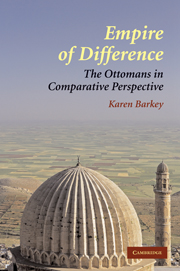Book contents
- Frontmatter
- Contents
- Preface
- Transliterations
- PART I AN IMPERIAL MODEL
- 1 Introduction
- 2 Emergence: Brokerage across Networks
- 3 Becoming an Empire: Imperial Institutions and Control
- 4 Maintaining Empire: An Expression of Tolerance
- 5 The Social Organization of Dissent
- PART II THE TRANSFORMATION OF THE EIGHTEENTH CENTURY
- Bibliography
- Index
- References
2 - Emergence: Brokerage across Networks
Published online by Cambridge University Press: 05 September 2012
- Frontmatter
- Contents
- Preface
- Transliterations
- PART I AN IMPERIAL MODEL
- 1 Introduction
- 2 Emergence: Brokerage across Networks
- 3 Becoming an Empire: Imperial Institutions and Control
- 4 Maintaining Empire: An Expression of Tolerance
- 5 The Social Organization of Dissent
- PART II THE TRANSFORMATION OF THE EIGHTEENTH CENTURY
- Bibliography
- Index
- References
Summary
The Turkish raiders are called in their language akandye [sic. akıncı], which means “those who flow,” and they are like torrential rains that fall from the clouds. From these storms come great floods until the streams leave their banks and overflow, and everything this water strikes, it takes, carries away, and moreover, destroys, so that in some places they cannot quickly make repairs. But such sudden downpours do not last long. Thus also the Turkish raiders, or “those who flow” like rainstorms, do not linger long, but whatever they strike they burn, plunder, kill, and destroy everything so that for many years the cock will not crow there.
This chilling description of Turkish cavalrymen descending on villages in northwestern Anatolia at the frontiers of the Byzantine Empire was reproduced many times by numerous fifteenth-century chroniclers of various origins; this particular one is from the pen of Konstantin Mihailovic, a Serb who served in the Janissary army. These authors reflect a certain reality of the frontier zones, where boundaries between fractured and decaying empires and past kingdoms were eroding, where the further one got from centers of authority, the further removed from law and order, the lower the stakes, the greater the thrills, and the more the expectation of “chaos.” Yet, in many ways it was from the disorder and uncertainty of the frontier that a world-class empire was born at the twilight of the thirteenth century.
- Type
- Chapter
- Information
- Empire of DifferenceThe Ottomans in Comparative Perspective, pp. 28 - 66Publisher: Cambridge University PressPrint publication year: 2008
References
- 1
- Cited by

